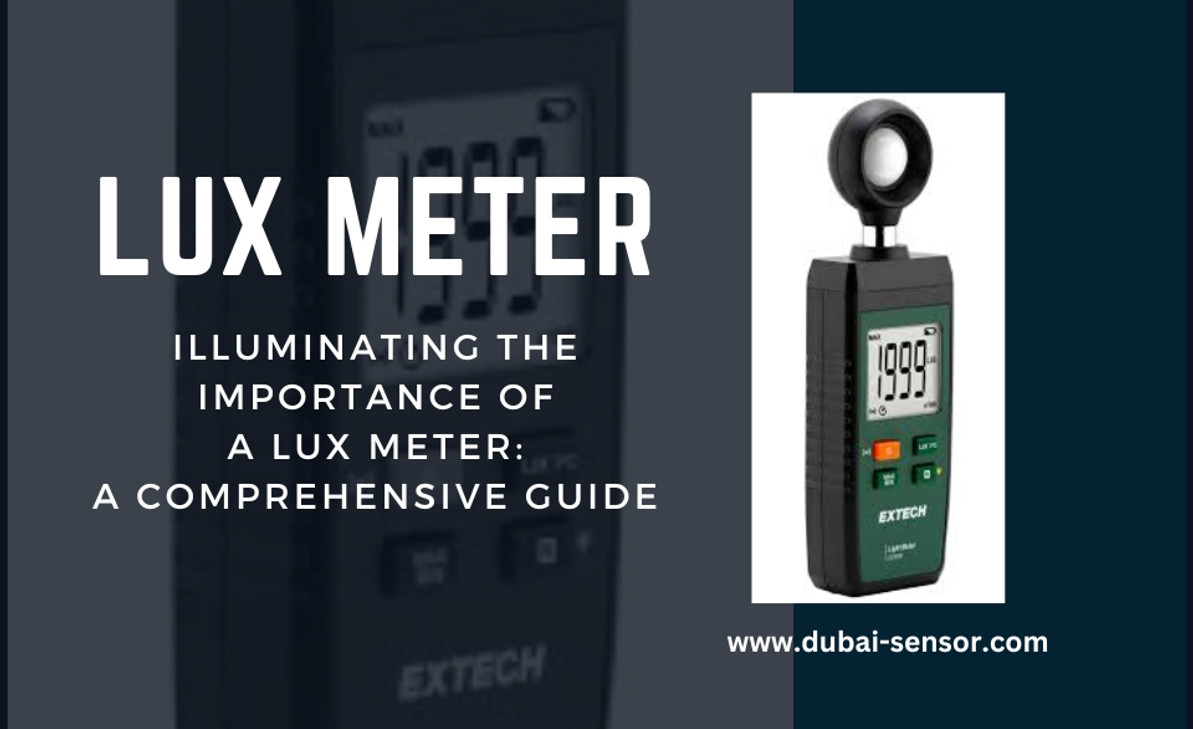Illuminating the Importance of a Lux Meter: A Comprehensive Guide
Lux meters or light meters are electronic devices that depict the light intensity and brightness of an area. Lux is a measure of light flux per unit of an area and is measured by a lux meter device.
Lux, kilolux hours, and microwatts per lumen are units for measuring different qualities of light. They can be explained quite simply.
Lux
Lux Is the unit that indicates the intensity to which a surface is lit, or the brightness of the light.
The closer the light source is to the surface being lit, the higher the lux value will be, that is the greater the intensity of light.
So if we want to lower the intensity of light falling on an object we can simply move it further away from the light source. For example, if the brightness or intensity of light falling on an object is measured at 100 lux when the object is 1 meter away from the light source, we can alter that intensity to 25 lux by moving the object to a distance of 2 meters from the light source.
Kilolux Hours
This unit indicates the exposure to light over a while. Take the example of a historic costume on permanent display in a museum. The museum is open 5 days a week for 5 hours a day all year round and while the museum is open, the costume receives light to an intensity of 200 lux. In a year the costume is exposed to
5 x 5 x 52 x 200 lux hours = 260000 lux hours or 260 kilolux hours
This could be brought to within the levels recommended in the guidelines by adjusting the intensity of light falling on the costume and/or reducing the display time. For example, if the intensity of light was lowered to 50 lux and the costume was on display for only 6 months of the year, the total annual exposure would be significantly altered:
5 x 5 x 26 x 50 lux hours = 32500 lux hours or 32.5 kilolux hours
Microwatts Per Lumen (µW/lm)
Microwatts per lumen indicates the amount of UV energy in the light coming from a light source. Microwatts are a measure of energy; lumens measure the quantity of light from a particular light source.
This measurement is constant for a light source and does not alter if the readings are taken at a greater distance from the source. If we want to lower the UV content of the light, we can use absorbing filters on windows or fluorescent tube fittings, or we can install lights that give out only small amounts of UV radiation. Above all, we must try to exclude sunlight.
Special instruments can be purchased to measure light and UV levels. The intensity of light on an object is measured with a lux meter and the UV content of the light is measured with a UV meter.
What is a lux Meter?
Do you know what the lighting standard is for different environments? Certainly, the lighting of different environments such as corridors and staircases, dining halls, and spaces inside residential and office buildings are very different from spaces such as laboratories, libraries, stores, and greenhouses. To measure light intensity for different places, a light meter or lux meter is needed.
Lux Meter Technical Specifications
- Cosine function
Light entering the photodetector can be refracted and can cause measurement errors, and this can be corrected with some photodetectors.
- Operating temperature
It is the maximum ambient temperature at which the optical detector can work effectively. Photodetectors can be damaged at temperatures above 1200F.
- Range
The dynamic detection range of the light meter is expressed in lux or footcandles.
Lux Meter Facilities
- Automatic shutdown
Electronic lux meters can automatically shut down if the device remains idle.
Backlight
- The LCD screen has a backlight feature for low-light measurement.
Battery Indicator
- A low battery can cause fluctuating meter readings, so a battery indicator is useful.
Filters
- This option allows the user to remove certain wavelengths such as background light that affect the measurement.
- Memory and USB
The memory option will be useful for saving measurements and the USB ports can be used to connect to a computer and can also be used for charging.
- Outdoor
The meter is suitable for outdoor applications, which will have the greatest difference in light intensity.
Measuring Microwatts Per Lumen
The amount of energy in the ultraviolet band can be measured using a UV meter/monitor. This device measures the amount of ultraviolet light energy in each lumen of light. Measuring the UV content of light can be useful in determining whether or not you have a problem. For example, a conservator taking UV readings in an art center in the far north of South Australia expected very high UV content. The building is not in a sheltered position, and the principal light source is sunlight. The readings, however, were low, because the building has Perspex windows instead of glass.
Perspex does not allow as much UV radiation to pass through it as glass. Because the Perspex develops static electricity, it attracts the red dust which surrounds the building. This also helps to reduce UV radiation passing through the windows. In this case, a problem was expected but did not exist.
What is the Intensity of Light?
It can be said that lux is a measure of light intensity in an environment for all distances from the light source, in other words, lux is the amount of light difference that is recognized by the human eye in different environments, and the importance of its measurement is that the quality Light in the workplace, schools, and public buildings affects the quantity and quality of work in workers and students.
What is a Candle?
A candela (a measure of light power) is a constant value that is roughly equivalent to the brightness of a candle. While the candela is a unit of energy, it has an equivalent unit known as the lumen, which measures the amount of light in the environment as perceived by the human eye.
What is Lumen?
A lumen is equivalent to the light produced in one direction from a light source with one candela. Lux affects how bright it is according to the surface area where this light is emitted. One lux is equal to one lumen of light on the surface of one square meter.
How to measure the level of illumination or ambient illumination requires the use of foot-candle meters, which are devices for measuring brightness. This is specifically the measurement of the light intensity that reaches the human eye, and this is different from the measurement of the actual light energy produced or reflected from a light source or sources (as you know, light particles have the nature of photons and energy).
The mechanism of a luxury converter works by using a photocell to record light. Then the luxury meter converts this light into an electric current and measures this current allowing the device to measure the brightness of the luxury environment based on a function.
The calculation of light intensity is done using the point source process. The measurement of light intensity varies depending on the intensity and distance of the light. If a point source has no reflection, it means that only part of the emitted light reaches the surface.
Note: To measure the brightness of an environment, it is better to choose a closed environment to work in to avoid environmental noise.
What are the types of lux meters?
All kinds of lux meters are used in different industries such as photography, the lighting industry, workplaces, offices, training classes, places for displaying works of art, and videography. Photographers often shoot in low-light environments, and with the help of a light meter, they can easily measure the amount of light and use it in such a way as to obtain ideal conditions for photography.
How to Work With Lux Meter
It is very easy to measure the light intensity and how works with a lux meter. To measure the light intensity, we must have a relative familiarity with the light intensity in different environments. Almost most of the lux meter devices have the same capabilities, the difference is in display speed, display accuracy, and measurement range.
The measurement of brightness can be used for the following purposes.
- Environmental measurement: determination of brightness intensity and its average and luminance
- Local measurement: determining the intensity of brightness and luminance at a specific location
- Measurement for technical evaluation and audit purposes
How to Read in the Lux Meter Device
To take the light reading, place the light meter sensor in the place to be measured and connect the sensor to the device with a cable. It looks like a white bulb, check the reading displayed on the screen, and the reading is done.
Recent Posts
-
Booster Pump Troubleshooting and Maintenance: How to Fix and Prevent Common Issues
1. Introduction Imagine turning on your faucet only to be greeted with a weak trickle of water when …22nd Apr 2025 -
Energy-Efficient Booster Pumps: Selection and Tips for Maximizing Performance
1. Introduction Imagine never having to deal with fluctuating water pressure, noisy pumps, or skyroc …19th Apr 2025 -
Booster Pumps for Sustainable Water Systems: Irrigation and Rainwater Harvesting Solutions
1. Introduction Water scarcity is no longer a distant threat—it’s a reality affecti …16th Apr 2025




